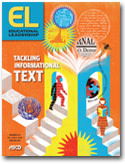It's probably happened to all of us at some point: We have an accident, like spilling a cup of coffee, and reflexively our minds want to hit the "undo" arrow. When we snap back to the realization that the physical world doesn't respond to our errors as neatly as the digital one, we may wonder, What's happening inside our brains? Could exposure to digital media be rewiring them in some subtle, yet profound way?
Two thousand years ago, Plato asked the same question about the "new" technology of his day: literacy. Reading and writing, he opined, weakened the mind and destroyed memory. In some ways, he was right. Psychologists and anthropologists have since determined that literacy fundamentally rewires our brains. It makes us more analytical, introspective, and abstract thinkers, yet less adept at other things, such as reciting epic poems from memory (Ong, 2002).
So educators might reasonably wonder whether digital technology could be changing the way today's students think.
Lost in Hyperspace
Research has shown that the myriad bells and whistles of modern media, from newscast scrawls to "you've got mail" messages to hyperlinks luring us away from our reading, all make it more difficult to assimilate information. A study of CNN Headline News, with its multiple distractions of sport scores, weather updates, and stock prices crawling across the screen, tested how well college students (who reportedly prefer this kind of "busy" news) comprehend news stories surrounded with distracting information. It found that for all their media savvy, these young viewers recalled significantly less actual news content than a comparison group who watched the same broadcast without distractions (Greenfield, 2009).
Studies have also found that the mere presence of hyperlinks in text reduces reading comprehension, likely because it breaks up reading flow and leaves readers feeling disoriented or "lost in hyperspace" (Otter & Johnson, 2000). Even if we ignore the hyperlinks, our brains must work overtime to determine whether or not to follow them (Hinesley, 2007).
Distracted by the Irrelevant
The trouble with processing multimedia appears to lie in our working memories' limited capacities. Our brains, in some ways, are like computers with enormous hard drives for storing knowledge, but small memory chips for processing information. The psychological term for this is cognitive load; when information exceeds the space on our memory chips, we are unable to process or retain new knowledge.
Nicholas Carr (2010), who writes frequently about technology's impact on the brain, observes that our minds are hard-wired to "crave the new even when we know it's trivial." The Internet offers a torrent of stimuli; when we go online, so much zips past us that we end up processing very little. In contrast, when we read through more traditional print media we can regulate information flow by varying our reading pace. That's why, in Carr's words, the difference between surfing the web and reading print is the difference between the visual rush of jet skiing and the immersive experience of scuba diving (Carr, 2008).
Multitasking: Doing Many Things Poorly
Many students insist that they're proficient with multitasking. Yet research suggests otherwise. A team from Stanford University (Ophir, Nass, & Wagner, 2009) asked two groups, one heavy media multitaskers and the other light media multitaskers, to perform tests that required them to focus and drown out distractions—for example, determining whether red rectangles in a field of irrelevant blue ones changed orientation from one screen to the next. The heavy media multitaskers were significantly slower at this exercise. They also performed worse on tests of task-switching ability (such as identifying whether letters were consonants or vowels and then switching to identifying whether numbers were odd or even). Researcher Clifford Nass told the New York Times that instead of having some "secret ability" to multitask, "high multitaskers are suckers for irrelevancy" (Pennebaker, 2009).
Changing the Way We (and Our Students) Think
All of this suggests that heavy exposure to digital technology may be altering how learners think and read. As University of California–Los Angeles developmental psychologist Patricia Greenfield (2009) writes, "Every medium develops some cognitive skills at the expense of others" (p. 71). Digital media appear to have improved our visual abilities, for example, but at the expense of some of the very abilities the Common Core State Standards and the Next Generation Science Standards call on our students to develop: "analysis, critical thinking, imagination, and reflection" (p. 71).
What We Can Do
Fortunately, increased exposure to digital media doesn't doom our students to becoming easily distracted wanderers through a digital world. A small-scale, but in-depth study of 11 students selected for their combination of high reading scores, high grades, and Internet reading experience found that when these students went online, they applied traditional reading comprehension strategies, such as accessing prior knowledge, inferential reasoning, and self-regulation. The researchers concluded that such skills as "selecting relevant passages and evaluating one's reading goal achievement," which are important when reading print, are "compulsory in hypertext reading" (Coiro & Dobler, 2007, p. 242). They worried, however, that these skills are the very ones that weak readers most often struggle to develop.
Few would argue for making digital media permanently off-bounds to students. But the lesson of the research may be that educators should not feel compelled to rush students into digital media, especially when those students are struggling with reading comprehension. Just as the ancient Greeks deemed it wise to retain older learning methods like oral debate and Socratic questioning to offset any mental laziness literacy might bring, modern educators might reasonably conclude that preparing students for the digital age requires retaining some time-honored approaches to learning, including helping students avoid distractions, focus on what's relevant, and dive deep into learning.
